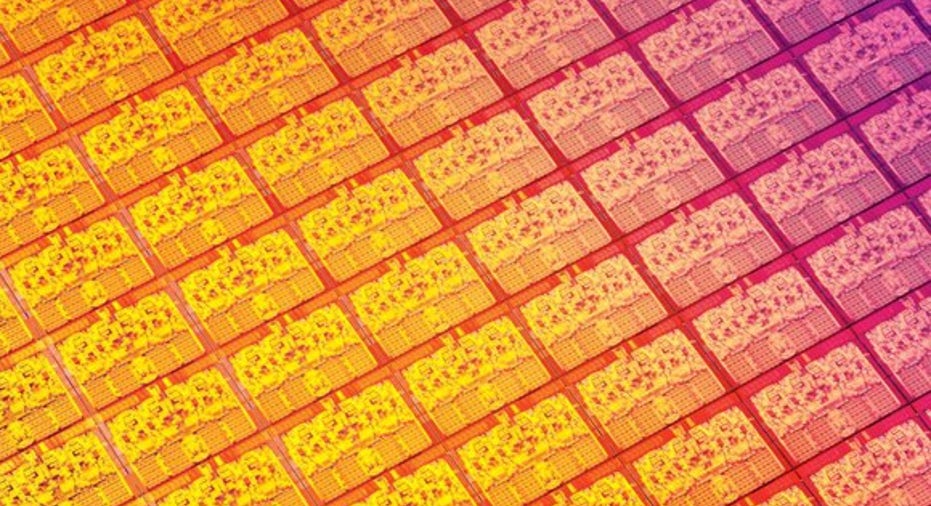Will Apple Use an Intel Custom Foundry to Build Future A-Series Chips?

Image source: Intel.
At microprocessor giant Intel's (NASDAQ: INTC) developer forum earlier this month, the company disclosed that it will build a future mobile processor for LG Electronics on the former's upcoming 10-nanometer chip manufacturing technology.
Although the financial impact of this deal to Intel is unlikely to be significant for a number of reasons (more on that in a coming column), this has rekindled the following, seemingly age-old question: "Does this mean that Intel will build future A-series processors for Apple(NASDAQ: AAPL)?"
Intel's next shot is in the 2018 iPhone
The A10 chip inside the upcoming iPhone 7 and 7 Plus series of smartphones is expected to be manufactured by Taiwan Semiconductor (NYSE: TSM) on its current-generation 16-nanometer FinFET Plus manufacturing technology. The A10 is expected to be manufactured in TSMC's 10-nanometer manufacturing technology, which should be in mass production a couple of quarters before Intel's own 10-nanometer technology is in production.
Intel's next real shot at building the processor for the iPhone, then, would be for the A12 chip that will go inside the 2018 iPhone.
The two processes that Apple could use for this product and likely achieve similar performance, power, and area metrics would be Intel's 10-nanometer technology and TSMC's 7-nanometer technology.
Going with Intel might be an unnecessary risk for the A12; A13 more likely
Apple is certainly fond of supplier diversity and likes to have multiple sources for components to get better pricing on said components. It would be in Apple's best interests to have multiple strong, viable chip manufacturing partners, especially in light of a recent report from Digitimes claiming that Apple dares not try to squeeze TSMC for better pricing since it has reportedly found it "difficult to find alternative sources" to TSMC.
That being said, Intel doesn't have a proven track record of being able to ramp up tens of millions of a third party's chip design on a bleeding-edge chip manufacturing technology. TSMC does.
Over the long term, Apple may very well choose to go through the work to second-source a design at Intel. However, I wouldn't expect Apple to risk it with the A12. I could see Apple giving Intel a shot for the A13 for the 2019 iPhone.
By then, Apple will have gotten to see how Intel handled the production ramp-up of LG's upcoming 10-nanometer chip, and Intel's 10-nanometer process should be quite mature. It will have been in production for about a year-and-a-half when it comes time to ramp up the A13.
If Intel shows it can deliver on being a world-class contract manufacturer for third-party chipmakers, then I could see Apple giving Intel a minority allocation of the A13, on perhaps 20% to 30% of the orders.
This has to be what Intel is gunning for
At the end of the day, the only potential foundry deal in the mobile market that would truly be worth all of the investment that Intel seems to be making into its contract chip manufacturing business would be a win at Apple.
Winning, and sustaining, business at Apple would drive both significant unit volumes as well as non-trivial revenues. It would also, in my view, drive improved execution at the chipmaker in terms of ramping up new manufacturing technologies. If Intel can win the Apple business, losing it in future generations would be painful, so this could potentially light a fire under Intel to really succeed.
Not only would improved execution help Intel try to hang on to business with Apple, but it would accelerate the pace of manufacturing innovation at Intel as a whole, which would help improve the competitiveness of all of Intel's product lines -- PCs, servers, and the Internet of Things.
Whether Intel can ultimately win Apple -- and, if it does, whether it can keep it -- as a foundry customer remains to be seen.
A secret billion-dollar stock opportunity The world's biggest tech company forgot to show you something, but a few Wall Street analysts and the Fool didn't miss a beat: There's a small company that's powering their brand-new gadgets and the coming revolution in technology. And we think its stock price has nearly unlimited room to run for early-in-the-know investors! To be one of them, just click here.
Ashraf Eassa owns shares of Intel. The Motley Fool owns shares of and recommends Apple. The Motley Fool has the following options: long January 2018 $90 calls on Apple and short January 2018 $95 calls on Apple. The Motley Fool recommends Intel. Try any of our Foolish newsletter services free for 30 days. We Fools may not all hold the same opinions, but we all believe that considering a diverse range of insights makes us better investors. The Motley Fool has a disclosure policy.



















